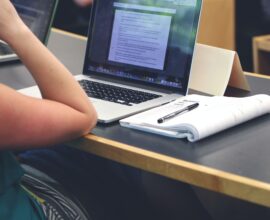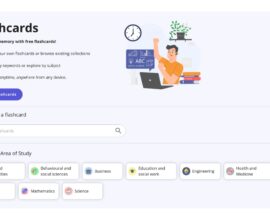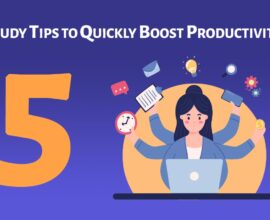Brain Food for Studying: Get the Most out of Your Study Sessions
During finals week, it’s easy to get overwhelmed by last-minute cramming and exam stress—before you know it, a healthy diet becomes the least of your priorities. However, what you eat around exam time affects both your long-term health and your study performance.
This quick guide will walk you through 12 scientifically-proven snacks and brain foods to help you stay nourished, laser-focused, and pumped up when studying, revising, or getting ready to sit for exams.
1. Oily Fish and Omega-3
Oily fish and seafood, such as salmon, mackerel, fresh tuna, herring, sardines, and trout, are rich in Omega-3 fatty acids, which are vital in brain health.
Foods containing Omega-3 are some of the best brain food for studying because they can help to:
- Sharpen memory
- Improve mood and support learning
- Maintain concentration and alertness
- Improve depression symptoms
In the long run, Omega-3 intake can slow down age-related cognitive decline and help to prevent Alzheimer’s disease.
It’s crucial to eat Omega-3 rich foods because your body isn’t able to produce these healthy fats from scratch. You can also get Omega-3 from other sources, such as seeds (flaxseeds), nuts (walnuts), and fish oil supplements.
2. Berries
Berries, such as blueberries, strawberries, and blackberries, contain a number of beneficial compounds that directly affect your brain health. These include flavonoid compounds called anthocyanins which increase blood flow to the brain and can help improve your overall mental function.
Anthocyanins contain high levels of antioxidants that give an easy boost to your brain health by:
- Preventing cell damage
- Delaying brain aging
- Enhancing cellular processes which are crucial to learning and memory retention
Give your brain a boost whenever you hit the books by adding berries to your breakfast cereal, crushing them in a smoothie, or enjoying them as a snack.
3. Dark Chocolate
If you like eating chocolate—particularly dark chocolate—you’ll be happy to know that it’s good brain food for studying! It is rich in minerals like iron, magnesium, potassium, zinc, and fibre. Dark chocolate also contains brain-healthy compounds such as caffeine and flavonols.
Flavanols improve the production of nitric oxide in the blood, which can help with blood flow to the brain. Chocolate also stimulates the release of endorphins, which trigger positive feelings to help you hit the books in a good mood.
Don’t overindulge, though! Snacking on just one small bar of quality dark chocolate a day is enough to help you:
- Boost memory and attention span
- Increase blood flow to the brain and skin
- Reduce mental fatigue
- Improve insulin sensitivity and decrease blood pressure
- Slow down mental decline
4. Beetroots
If you don’t include beetroots in your diet, you are missing out on improving your overall brain function. Beets are a good source of nitrates that improve blood flow to the brain, enhance nerve cell communication, and increase cognitive function.
You can raise your intake of nitrates and improve your overall brain health by eating roasted beets, drinking fresh beet juice, or adding beets to your favourite dish.
5. Citrus Fruits
Do you know that vitamin deficiency can affect your mood? Citrus fruits are rich in vitamin C, which improves your ability to handle tasks that involve focus, attention, memory, and decision-making. They also have other vitamins and minerals that are necessary for your overall health, such as B vitamins, magnesium, potassium, phosphorus, and copper.
Plant compounds, such as flavonoids, found in citrus fruits protect the nervous system and enhance mental performance.
Citrus fruits include grapefruits, limes, oranges, lemons, and mandarin.
You can easily sip citrus fruit juices or snack on whole fruits when studying or cramming for an exam for a boost.
6. Water
Hydration is essential for proper brain function. Even mild dehydration can make you lose concentration quickly, experience headaches, and feel tired. Depending on the source, water provides your body with different levels of trace minerals like calcium, magnesium, and zinc.
On the exam day, drink plenty of water in the morning and carry a water bottle to the exam hall. Staying hydrated will help you think clearly, focus, and alleviate anxiety.
7. Green Tea
If you want to minimise anxiety, boost your concentration, and feel more relaxed during your study sessions, drink green tea. It is rich in vitamins and minerals such as vitamin E, vitamin C, β-carotene, vitamin B2, folic acid, potassium, phosphorus, and calcium.
It also has different constituents that increase your brain power, such as:
- L-theanine—gives you a calming and anxiety-relieving effect
- Antioxidants—protects the brain from free radicals
- Caffeine—improves alertness and steadily boosts energy
Green tea is a healthy alternative for high-caffeine drinks that only provide a rapid and short-lived energy boost.
8. Avocados
How do you like your avocados? Mashed into guacamole, infused into an avocado pudding, spread on toast, or whole with some salt? Whichever way you add them to your diet, avocados are the best thing to eat before a test or during a study session.
They are a great source of monounsaturated fats, which helps to improve memory and lutein, a carotenoid that supports proper brain function.
Avocados are also rich in vitamins, protein, fibre, and folate, all of which support your overall brain health.
9. Protein Snacks
Protein is crucial for proper brain functioning. Don’t rush for junk food like candy, soda, or any other source of simple sugar, though. Junk foods will only give you a fast and temporary energy boost that depletes rapidly. Instead, you should focus on snacks that provide a slower release of energy throughout the day, preferably from healthy sources.
Some of the great protein snacks to take before your next test could include granola bars, almonds, walnuts, pumpkin seeds, energy bars, trail mix, oats, and protein bars. These are all cheap and available anywhere!
10. Dark Leafy Green Vegetables
Your brain (and body in general) work best with a slow and steady supply of energy. On a test day, the last thing you want is rapid energy peaks and sudden drops.
Vegetables are among the best food groups that play a vital role in controlling your energy levels. They contain high levels of fibre and complex carbohydrates, which slows up digestion to ensure the energy in food is released slowly throughout the day.
Leafy green vegetables also contain other healthy nutrients like antioxidants, beta carotene, iron, lutein, folate, and vitamin K. Examples of nutritious vegetables are kale, spinach, collards, parsley, basil, peas, leeks, lettuce, carrots, broccoli, and green and red peppers.
A sufficient dietary intake of leafy greens will help you stay focused, focused, and relaxed during a test or study session.
11. Healthy Carbohydrates
Brain cells run on glucose made from the carbohydrates you consume. The brain doesn’t store excess glucose but requires a steady supply to run consistently throughout the day. Complex carbohydrates release energy slowly and steadily, which helps you concentrate and maintain your focus levels all day.
Some good sources of healthy complex carbohydrates include lentils, whole grains, and chickpeas. Grab a whole grain toast or any complex carbohydrates of your choice, and you’ll have a healthy boost of long-lasting energy to carry you through your study sessions.
12. Eggs
Eggs are a great choice of brain food to eat before an exam or during a study session. They have a high concentration of nutrients like vitamin B12, choline, lutein, and selenium that are essential for brain functions, like sustaining memory and building fresh neural pathways.
Choline, which is present in the egg yolk, enhances a neurotransmitter that helps with memory retention and communication in brain cells.
If you can’t eat eggs, you can get choline from other foods, such as mushrooms, beef liver, and cauliflower.
Bottom Line
Adding these healthy brain foods to your diet will help you maintain top mental focus during exams and revision. You can also develop some life-long healthy eating habits while you’re at it!
If you want to eliminate exam stress and last-minute cramming during the final weeks, it’s also a good idea to build proactive study habits early on. You can create a study schedule that allows you to master time management skills, get homework/assignments done in time, and get more downtime to relax.
Let us help you take the stress out of your study and exam time! Our online learning app has effective revision tools like study flashcards to help you prepare well and ace your exams. You can also get homework help from professional tutors throughout the semester to ensure you always complete your assignments on time and understand your course work early on.






